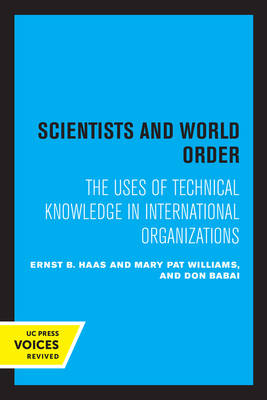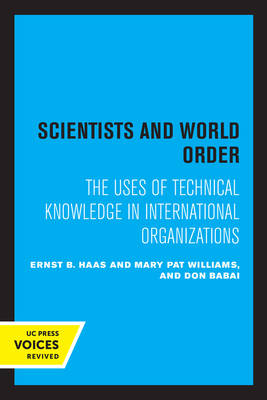
- Afhalen na 1 uur in een winkel met voorraad
- Gratis thuislevering in België vanaf € 30
- Ruim aanbod met 7 miljoen producten
- Afhalen na 1 uur in een winkel met voorraad
- Gratis thuislevering in België vanaf € 30
- Ruim aanbod met 7 miljoen producten
Zoeken
Scientists and World Order
The Uses of Technical Knowledge in International Organizations
Ernst B Haas, Mary Pat Williams, Don Babai
Paperback | Engels
€ 84,95
+ 169 punten
Uitvoering
Omschrijving
Scientists and World Order: The Uses of Technical Knowledge in International Organizations by Ernst B. Haas, Mary Pat Williams, and Don Babai is a pioneering study of the intersection between scientific expertise and global governance. Drawing on interviews with over two hundred scientists and officials across institutions such as the United Nations, UNESCO, WHO, and the European Communities, the book investigates how internationally active scientists conceive of their responsibilities and how their knowledge shapes policy. The authors examine rationalist, pragmatic, and skeptical "world order models," showing how different cognitive assumptions about knowledge and action inform institutional programs in areas ranging from environmental management to economic development. By tracing the evolution of nine major international science programs between the 1960s and 1970s, the authors reveal how technical expertise becomes institutionalized, contested, and refracted through political negotiation. At stake is whether science can serve as a transnational language for solving pressing problems--poverty, disease, energy, pollution--or whether political constraints and clashing goals limit its impact. Combining political science, sociology of science, and international relations, Scientists and World Order maps the cognitive terrain on which science, technology, and policy meet, offering a critical framework for understanding the promises and limits of scientific expertise in shaping world order. This title is part of UC Press's Voices Revived program, which commemorates University of California Press's mission to seek out and cultivate the brightest minds and give them voice, reach, and impact. Drawing on a backlist dating to 1893, Voices Revived makes high-quality, peer-reviewed scholarship accessible once again using print-on-demand technology. This title was originally published in 1977.
Specificaties
Betrokkenen
- Auteur(s):
- Uitgeverij:
Inhoud
- Aantal bladzijden:
- 380
- Taal:
- Engels
Eigenschappen
- Productcode (EAN):
- 9780520321472
- Verschijningsdatum:
- 27/05/2022
- Uitvoering:
- Paperback
- Formaat:
- Trade paperback (VS)
- Afmetingen:
- 156 mm x 234 mm
- Gewicht:
- 585 g

Alleen bij Standaard Boekhandel
+ 169 punten op je klantenkaart van Standaard Boekhandel
Beoordelingen
We publiceren alleen reviews die voldoen aan de voorwaarden voor reviews. Bekijk onze voorwaarden voor reviews.







